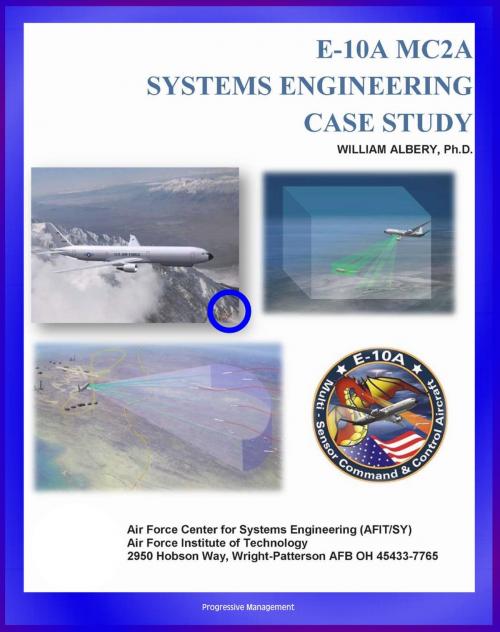E-10A MC2A Systems Engineering Case Study: The E-10 Story, Systems Engineering Principles, Multi-role Military Aircraft for AWACS Duty
Nonfiction, Science & Nature, Technology, Aeronautics & Astronautics, History, Military, Aviation| Author: | Progressive Management | ISBN: | 9781476241166 |
| Publisher: | Progressive Management | Publication: | July 19, 2012 |
| Imprint: | Smashwords Edition | Language: | English |
| Author: | Progressive Management |
| ISBN: | 9781476241166 |
| Publisher: | Progressive Management |
| Publication: | July 19, 2012 |
| Imprint: | Smashwords Edition |
| Language: | English |
This is one of a series of systems engineering case studies prepared by the Air Force Center for Systems Engineering. This case study analyzes the E-10A MC2A program. The Northrop Grumman E-10 MC2A was planned as a multi-role military aircraft to replace the Boeing 707 based E-3 Airborne Warning and Control System (AWACS) Sentry, E-8 Joint Surveillance Target Attack Radar System (J-STARS), and RC-135 Rivet Joint aircraft in US service. It was based on the 767-400ER commercial airplane.
The Department of Defense is exponentially increasing the acquisition of joint complex systems that deliver needed capabilities demanded by our warfighter. Systems engineering is the technical and technical management process that focuses explicitly on delivering and sustaining robust, high-quality, affordable solutions. The Air Force leadership has collectively stated the need to mature a sound systems engineering process throughout the Air Force. Gaining an understanding of the past and distilling learning principles that are then shared with others through our formal education and practitioner support are critical to achieving continuous improvement.
These cases support academic instruction on SE within military service academies, civilian and military graduate schools, industry continuing education programs, and those practicing SE in the field. Each of the case studies is comprised of elements of success as well as examples of SE decisions that, in hindsight, were not optimal. Both types of examples are useful for learning. Along with discovering historical facts, we have conducted key interviews with program managers and chief engineers, both within the government and those working for the various prime and subcontractors. From this information, we have concluded that the discipline needed to implement SE and the political and acquisition environment surrounding programs continue to challenge our ability to provide balanced technical solutions.
Chapter 1 * SYSTEMS ENGINEERING PRINCIPLES * 1.1 General Systems Engineering Process * 1.2 DoD Directive 5000 Series * 1.3 Evolving Systems Engineering Process * 1.4 Case Studies * 1.5 Framework for Analysis * Chapter 2 * E-10A SYSTEM DESCRIPTION * 2.1 Characteristics * 2.2 Development * 2.3 E-10A Capabilities * 2.3.1 Scale-back * 2.3.2 Cancellation * 2.4 Specifications (767-400ER) * Chapter 3 * THE E-10 STORY * 3.1 Acquisition Strategy * 3.1.1 Contractors * 3.1.2 MP-RTIP * 3.2 BMC2 * 3.2.1 The Role of the BMC2 Suite * 3.2.2 767-400ER Commercial (Green) Aircraft * 3.2.3 Weapon System Integration (WSI) * 3.2.4 MC2A Evolution * 3.3 System Development Plan * 3.3.1 Development Phases * 3.3.2 Program Budget Decision 753 * 3.4 Model-Based Systems Engineering * 3.4.1 MBSE and the Sociological Challenges of the E-10A Program11 * 3.4.2 Architecture-Centric Approach for the E-10A * Chapter 4 * SUMMARY/CONCLUSION * APPENDICES * Appendix A: A Framework for Systems Engineering Concept and Responsibility Domains * Appendix B: Author Biographies * Appendix C: E-10A TDP AS ADM 30 May 06 * Appendix D: Term TDP AS ADM 30 May 07 * Appendix E: PBD 753 * Appendix F: Defense Planning Guidance FY04-09 * Appendix G: Acronyms Appendix H: References
This is one of a series of systems engineering case studies prepared by the Air Force Center for Systems Engineering. This case study analyzes the E-10A MC2A program. The Northrop Grumman E-10 MC2A was planned as a multi-role military aircraft to replace the Boeing 707 based E-3 Airborne Warning and Control System (AWACS) Sentry, E-8 Joint Surveillance Target Attack Radar System (J-STARS), and RC-135 Rivet Joint aircraft in US service. It was based on the 767-400ER commercial airplane.
The Department of Defense is exponentially increasing the acquisition of joint complex systems that deliver needed capabilities demanded by our warfighter. Systems engineering is the technical and technical management process that focuses explicitly on delivering and sustaining robust, high-quality, affordable solutions. The Air Force leadership has collectively stated the need to mature a sound systems engineering process throughout the Air Force. Gaining an understanding of the past and distilling learning principles that are then shared with others through our formal education and practitioner support are critical to achieving continuous improvement.
These cases support academic instruction on SE within military service academies, civilian and military graduate schools, industry continuing education programs, and those practicing SE in the field. Each of the case studies is comprised of elements of success as well as examples of SE decisions that, in hindsight, were not optimal. Both types of examples are useful for learning. Along with discovering historical facts, we have conducted key interviews with program managers and chief engineers, both within the government and those working for the various prime and subcontractors. From this information, we have concluded that the discipline needed to implement SE and the political and acquisition environment surrounding programs continue to challenge our ability to provide balanced technical solutions.
Chapter 1 * SYSTEMS ENGINEERING PRINCIPLES * 1.1 General Systems Engineering Process * 1.2 DoD Directive 5000 Series * 1.3 Evolving Systems Engineering Process * 1.4 Case Studies * 1.5 Framework for Analysis * Chapter 2 * E-10A SYSTEM DESCRIPTION * 2.1 Characteristics * 2.2 Development * 2.3 E-10A Capabilities * 2.3.1 Scale-back * 2.3.2 Cancellation * 2.4 Specifications (767-400ER) * Chapter 3 * THE E-10 STORY * 3.1 Acquisition Strategy * 3.1.1 Contractors * 3.1.2 MP-RTIP * 3.2 BMC2 * 3.2.1 The Role of the BMC2 Suite * 3.2.2 767-400ER Commercial (Green) Aircraft * 3.2.3 Weapon System Integration (WSI) * 3.2.4 MC2A Evolution * 3.3 System Development Plan * 3.3.1 Development Phases * 3.3.2 Program Budget Decision 753 * 3.4 Model-Based Systems Engineering * 3.4.1 MBSE and the Sociological Challenges of the E-10A Program11 * 3.4.2 Architecture-Centric Approach for the E-10A * Chapter 4 * SUMMARY/CONCLUSION * APPENDICES * Appendix A: A Framework for Systems Engineering Concept and Responsibility Domains * Appendix B: Author Biographies * Appendix C: E-10A TDP AS ADM 30 May 06 * Appendix D: Term TDP AS ADM 30 May 07 * Appendix E: PBD 753 * Appendix F: Defense Planning Guidance FY04-09 * Appendix G: Acronyms Appendix H: References















